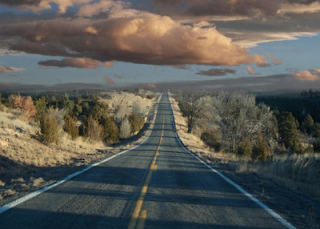TRAGEDY
Todays roads are the modern equivalent of an early English countryside .
Source of much of their culture's romantic imagery (Andrew Marvell, Jack Kerouak) these are spaces that no one controlls and, therefore, are as unmanageable as they are over-utilized.
Source of much of their culture's romantic imagery (Andrew Marvell, Jack Kerouak) these are spaces that no one controlls and, therefore, are as unmanageable as they are over-utilized.
The choking congestion of most urban space is a situation similar to what was first described in mid 18th century England as the tragedy of the commons. The commons was land at the center of most villages utilized by all, but owned by none. It worked well at times of limited population, but overuse usually resulted in decreasing returns both individually and in aggregate. The only apparent solutions are to limit access, or coordinate use, but both remove the essential freedom at the heart of the idea of a commons.
 We find ourselves at the same crossroads. Our best solutions seem to be increasing regulation of the open road. To increase the capacity of this shared space, even to mitigate the costs of the ever-increasing pressure we put on it, we will have to organize it in ways that will make it unrecognizable.
We find ourselves at the same crossroads. Our best solutions seem to be increasing regulation of the open road. To increase the capacity of this shared space, even to mitigate the costs of the ever-increasing pressure we put on it, we will have to organize it in ways that will make it unrecognizable.It must be the end of the commons.
And the end of the commons means the disappearance of a shared space that provides a sense of identity and a rich and sustaining myth of freedom. For many people increased safety and the opportunity to repurpose large swathes of urban and suburban land will more than compensate for the loss of personal freedom the system entails. Others will promise to resist until the steering wheel is wrenched from their cold, dead hands.
But a system it will be. The entire logic of autonomous vehicles pushes them inexorably to greater integration between vehicles and the roadway itself. Algorithms will develop to take advantage of every available piece of information about the vehicle, the nature and destination of its payload, and integrate it all with the countless other vehicles using the system. The end result will be a physical analogue to the internet, a programmable upgradable piece of hardware that allows humans to design and direct, but not actually drive, the system. And, as it disappears, the open road will grow around it a mythology as powerful as the American West, with a similar sense of loss. The comedy of our present circumstances transformed into tragedy.
The tragedy of commons, social justice, and the loss of democratic space.
Europe. Another indicator of the costs the system imposes on the modern world can be observed while walking though urban landscapes that were established before the advent of automobile travel. The scale of European cities is so appealing tourists spend billions every year just to walk their streets. The pleasure of freedom from the automobile is only possible in places where the necessities of life are within easy reach of someone on foot.Cities that have developed in the age of the automobile reflect the capacities of the vehicle—its speed and range—as well as its needs—parking and wide right of ways. Both these dynamics put the necessities of life both out of reach and out of sight of the average pedestrian. A space designed around the car is both unpleasant and downright dangerous to the pedestrian. Spending time in a walkable city makes it clear how much the modern American city is designed around the needs and capacities of the automobile. Walking an American suburb makes it clear how little (none at all, in fact) the needs of the pedestrian were considered in its design. It has sidewalks, but nothing that can be reached by foot.
Update the commons post. Retitled the last great commons. Jump directly into a description of enclosure and what it meant for English culture. Then transition to America's roads.
Every English Village, even every neighborhood and midsize cities, had a substantial space set aside for use by all inhabitants of that area. Essentially half a central park for every 10,000 people. One of the most disruptive acts in English history was the enclosure of the spaces and their subdivision into plots of economically valuable land. The result was often a. .....negative.
It was also one of the most essential components in the modernization of Europe.
For the commons had also enshrined the term tragedy of the commons. This was because the commons themselves were often benighted places that of been stripped of all natural capacity.
Enclosure created the incentive for production that led to the rehabilitation of huge areas of land, and provided the basis for the England's independence food independence as it moved into the 19 century.
But there was a critical, institutional failure to accommodate for the damaging aspects of enclosure.
The conclusion is primarily a call to recognize this resource for what it is, a huge legacy that we have left ourselves and the profit of its future you should be distributed fundamentally through society.
The functional management of these roads, i.e. the wash Dotz and S Dotz of the world, will be responsible for a huge resource that will now become available. Because of this it becomes increasingly important that those institutions function reliably and with the longest term possible goals in mind.
No offense, but we would certainly like to prove that we can do things better than the English in the 18th century..




Comments
Post a Comment